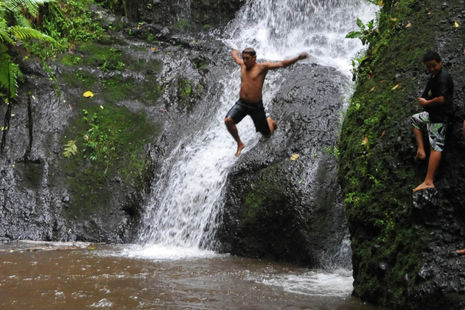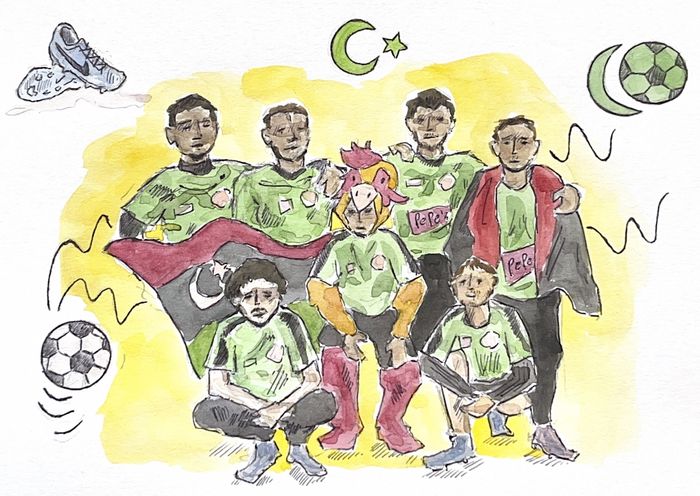Bombing: when water sports meets the spiritual
Imani Schawsmidth discusses New Zealand’s unique bombing culture, and the community significance of ‘popping a manu’

Many of us are familiar with dive-bombing. The cannonball was about the extent of my knowledge until I discovered the unique diving style practiced by Māori and Pasifika communities – manu jumping. ‘Popping a manu’ has been described as a “national pastime” in New Zealand by The Guardian, where divers jump from as high as they can with the goal of creating as large a splash as possible.
The Manu seems to have emerged in the 1990s, and serves as a means of connection and joy between participants. Neighbourhood kids, teenagers after a long school day, or local legends who’ve earned the prestige of being household names can all be seen trying to outdo one another with a larger splash.
“A ‘way of life’ and an art form”
In an article for Stuff last year, founder of Bomblife Hads Te Huia spoke of bombing as “more than a sport” – it being a “way of life” and an art form. For the Māori, water is seen as a source of life, in line with the Māori tradition of connection to and awareness of one’s environment. Water is likened to the blood of ‘Papatūānuku’, Earth Mother, which flows through all living things. The liquid itself has its own life-force, and Māori see themselves as connected to it and to the entirety of the natural world. This is core to Māori identity, and links an individual with their lineage, forming part of ‘whakapapa’ – the idea that there is an inextricable link between the histories of people, places and events. ‘Mauri’ – which can be translated as a life spark, or essence – is passed down through whakapapa.
Manu diving is undeniably an exhilarating recreational activity, but it is also intentional and occasionally competitive. Earlier this year, the Manu World Championships held ten qualifiers across eight cities, with $40,000 of prize money to be won in total. Participants bring their individually curated techniques to the competition, hoping to leave behind an enormity of water in their wake.
“Particpants hope to leave behind an enormity of water in their wake”
Bombing is not the only vehicle through which the Māori integrate spirituality into sport, however. The interplay between Māori cultural sentiments and sport is also made evident in the Haka, a ceremonial dance involving chanting and organised movement to display pride whilst welcoming the challenge posed by their opponents. During the 2011 Rugby World Cup, New Zealand’s All Blacks performed an especially powerful haka in front of their French competition. With over 83 million views on Youtube alone, this performance garnered excitement and interest across the globe.
This interplay is not reserved for Oceania. The Afro-Brazilian martial art form Capoeira combines elements of music, dance, acrobatics and – in a similar way to Manu diving – spirituality. Described as “half-dance, half-combat,” it is an ode to the legacy of both African and indigenous history – namely the resilience and strength of these groups despite their oppressive circumstances.
At the heart of these varied expressions of spirituality in sport lies a shared practice; an activity that brings people together across backgrounds and generations. All too often, I tune passively into commercialised sports from home. So it is all the more refreshing to be reminded that sport can be an expression that we make to ourselves, and to those we pass it onto, about what it means to engage with your community and your environment. It echoes the collective identity of those involved, and invites onlookers to share in this creative exhibition of culture.
It is my hope that less mainstream sports such as these will not remain so niche, but rather be equally recognised and celebrated for what they show us about those we often seem to be so ignorant of.
 News / Judge Business School advisor resigns over Epstein and Andrew links18 February 2026
News / Judge Business School advisor resigns over Epstein and Andrew links18 February 2026 News / Hundreds of Cambridge academics demand vote on fate of vet course20 February 2026
News / Hundreds of Cambridge academics demand vote on fate of vet course20 February 2026 News / Petition demands University reverse decision on vegan menu20 February 2026
News / Petition demands University reverse decision on vegan menu20 February 2026 News / CUCA members attend Reform rally in London20 February 2026
News / CUCA members attend Reform rally in London20 February 2026 News / Gov grants £36m to Cambridge supercomputer17 February 2026
News / Gov grants £36m to Cambridge supercomputer17 February 2026










